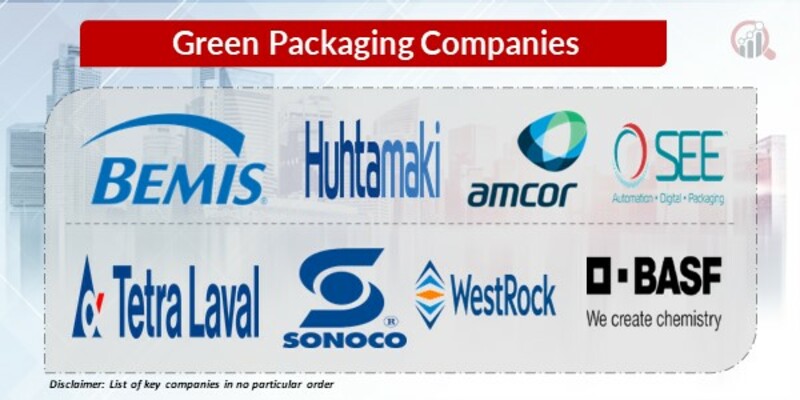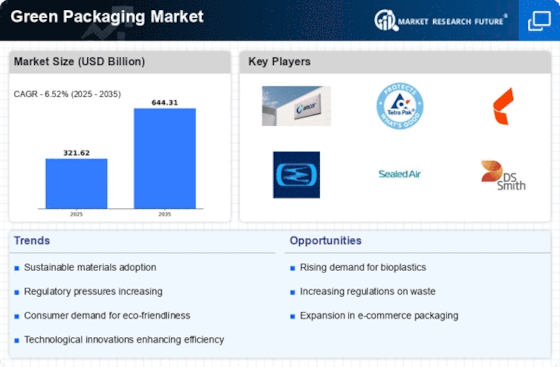Top Industry Leaders in the Green Packaging Market
 The green packaging market, surging with eco-conscious consumers and stringent regulations, has become a fiercely competitive battleground. Established players fight for dominance alongside nimble startups, all employing diverse strategies to capture market share. Let's delve into this dynamic landscape, exploring key trends, competitive tactics.
The green packaging market, surging with eco-conscious consumers and stringent regulations, has become a fiercely competitive battleground. Established players fight for dominance alongside nimble startups, all employing diverse strategies to capture market share. Let's delve into this dynamic landscape, exploring key trends, competitive tactics.
Market Share Drivers:
-
Material Innovation: Bioplastics derived from agricultural waste, edible coatings, and mushroom-based packaging are all vying for the crown of the most sustainable material. Companies like Evocative and Ecovative are leading the charge with their innovative solutions. -
Technological Advancements: From AI-powered sorting robots for recycling to smart labels that monitor freshness, technology is revolutionizing green packaging. Major players like Amcor and Sealed Air are heavily investing in R&D to stay ahead of the curve. -
Circular Economy: Minimizing waste through closed-loop systems is a top priority. Initiatives like Loop, a reusable packaging platform, are gaining traction, while established players like Unilever are partnering with waste management companies for efficient recycling. -
Consumer Preferences: Eco-conscious consumers are driving the demand for sustainable packaging. Companies like Patagonia and Whole Foods are capitalizing on this trend by implementing plastic-free packaging and highlighting their sustainability efforts. -
Regulatory Landscape: Stringent regulations, like the EU's Single-Use Plastics Directive, are pushing the industry towards greener solutions. This creates both challenges and opportunities for companies willing to adapt.
Competitive Strategies:
-
Acquisitions and Collaborations: Mergers and acquisitions, like Sealed Air's acquisition of ePac, enable companies to access new technologies and expand their market reach. Strategic partnerships, like Tetra Pak's collaboration with IKEA, allow for knowledge sharing and joint development of sustainable packaging solutions. -
Vertical Integration: Integrating the entire supply chain, from raw material sourcing to recycling, gives companies greater control over their sustainability footprint and cost-efficiency. Examples include Stora Enso's forestation projects and Mondi's closed-loop recycling facilities. -
Data-Driven Insights: Utilizing data analytics to optimize packaging design, resource consumption, and logistics helps companies achieve greater efficiency and reduce their environmental impact. Companies like DS Smith are using data to tailor packaging solutions to specific product needs. -
Brand Differentiation: Emphasizing a commitment to sustainability through marketing campaigns and transparent communication builds brand loyalty and attracts eco-conscious consumers. Patagonia's "Don't Buy This Jacket" campaign is a prime example of this strategy.
Key Players
- Bemis Company
- Huhtamaki OYJ (Finland)
- Amcor Limited (Australia)
- Sealed Air Corporation (US)
- Tetra Laval International S.A. (Switzerland)
- Sonoco Products Company (U.S.)
- WestRock Company (US)
- Smurfit Kappa Group PLC (U.S.)
- Mondi Plc. (South Africa)
- BASF SE (Germany) among others
Recent Developments:
March 2023: Major supermarkets in the UK pledge to eliminate plastic trays for fresh produce by 2025, prompting concerns about the availability of suitable alternatives.
April 2023: A new biodegradable adhesive based on seaweed shows promise for replacing synthetic adhesives in food packaging.
May 2023: Scientists develop a process to convert food waste into bioplastics, offering a potential solution for managing organic waste.
June 2023: The International Sustainability Standards Board releases draft guidelines for companies to report on their environmental impact, including resource use and waste generation, with specific focus on packaging.











